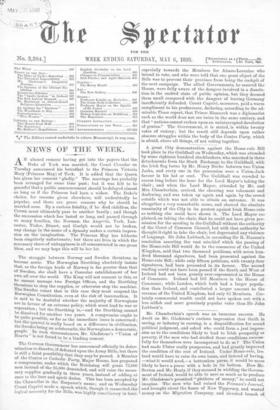Mr. Chamberlain's speech was an immense success. He dwelt on
Mr. Gladstone's curious impression that thrift in saving, or industry in earning, is a disqualification for sound political judgment, and asked who could form a just impres- sion as to the conditions likely to lead to Irish prosperity or poverty, if the men who had studied these conditions success- fully for themselves were incompetent to do so ? The Union had made Ulster really prosperous, and had greatly improved the condition of the rest of Ireland. Under Home-rule, Ire- land would have to raise its own loans, and instead of having, —what it would need,— a bottomless purse, it would be more likely to have a purse with a hole in its bottom. How Mr. Sexton and Mr. Healy, if they succeed in wielding the Govern- ment of Ireland, would be able to save as much as to produce Mr. Gladstone's promised plethora of money," he could not imagine. The men who had ruined the Freeman's ,Tournal, and brought about the fiasco of New Tipperary, and wasted money on the Migration Company, and elevated breach 4
contract into the first duty of man, were not likely to make Ireland very prosperous. To give Ireland into their keeping was like "setting the cat to watch the milk," as Mrs. Poyser put it; and he thought they were more likely to succeed in getting Ireland chiefly 'inhabited by absentees." The Irish Membera themselves are absolutely unanimous on the ruinous character of the financial proposals of the Bill. And on the fatal character of these proposals, and on the great danger to England of a quasi-independent Ireland, in time of war, Mr. Chamberlain insisted with extraordinary force and effective- ness, Great Britain was not going to flinch "before a sordid conspiracy of political adventurers." If she abandoned her two great principles, never to desert a friend and never to quail before a foe, we might well expect the decline and fall of the British Empire to begin.







































 Previous page
Previous page